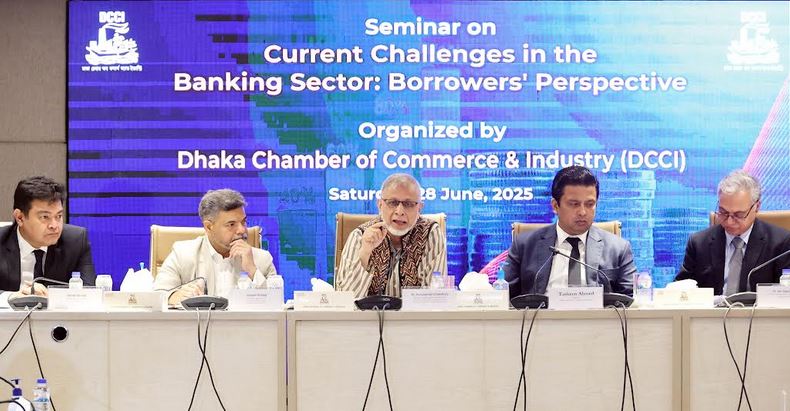News Flash
News Flash

DHAKA, June 28, 2025 (BSS)- Dr. Anisuzzaman Chowdhury, Special Assistant to the Chief Adviser today stressed the need for coordination between monetary and fiscal policy for the sake of overall macroeconomic stability of the country.
At the same time, he underscored the need for coordination and integration of policies for ensuring the reforms of the financial sector.
The Chief Adviser’s Special Assistant said this at a seminar on “Current Challenges in the Banking Sector: Borrowers' Perspective” organized by DCCI today at the DCCI Auditorium in the capital’s Motijheel area.
He said that both the borrowers and the lenders of the financial sector have to be responsive. “We must protect the formal sector, otherwise the development of the informal sector will be hampered,” he said.
Dr Chowdhury said that even in the current situation, the banks in good condition can reduce the interest rates to some extent if they want, which will provide some relief to the borrowers, especially the SME entrepreneurs.
DCCI President Taskeen Ahmed in his welcome address said as of mid-2025, the volume of non-performing loans (NPLs) has surged to an alarming Taka 4.2 lakh crore ($35 billion), up from Taka 3.45 lakh crore recorded in just six months before.
“This now accounts for over 24% of total outstanding loans, a level that undermines financial stability, investors’ confidence and the creditworthiness of the sector,” he said.
Taskeen Ahmed also said this would create a crisis of confidence and capacity, stemming from poor governance, weak recovery mechanisms and insufficient credit risk assessment.
He also said that a coordinated policy response, linking monetary tools with fiscal strategies is essential to restore confidence, stimulate credit flow and enable business revival.
Taskeen also proposed to allow a six-month extension in the current loan classification timeline to enable businesses to carry out viable revival strategies without being labelled as defaulter.
Ashraf Ahmed, former president and current Director of Dhaka Chamber, presented the keynote paper at the event.
He said the economy has faced several challenges in recent times, including devaluation of taka, rising US dollar exchange rate, supply deficit, import restrictions, high inflation, high interest rates, inadequate credit flow to the private sector etc.
He said that in 2025, interest rate of loans has been increased from 9% to around 14% and for which the private sector would have to pay Taka 1.39 trillion as additional interests.
Ashraf Ahmed also said that due to the increasing default loans, the credit flow to the industries would go downward that will lead to a lower investment, and weakening the private sector.
Ashraf Ahmed said the creditors should get the restructuring and rescheduling facilities under legal protection as a way of corporate revival.
Dr. Md. Ezazul Islam, Executive Director, Monetary Policy Department, Bangladesh Bank said that after 2014-15, few banks have gone under the control of certain families, which has led to instability in the overall financial sector.
He said after the political changeover in July-August last year, the confidence of entrepreneurs and borrowers started to regain following the central bank’s move to stable forex reserve and market-based currency exchange rate.
“For this, the private sector will be benefited at the end of the day,” he added.
Hossain Khaled, Group Managing Director, Anwar Group of Industries and former President, DCCI, said that SMEs are the main driving force and one of the partners in the supply chain of large enterprises. “So, if large enterprises suffer, it will have an impact on SMEs in the backward linkage,”
Abdul Hai Sarker, Chairman, Bangladesh Association of Banks, said due to weak policies of the government, the default loans are gradually increasing while the rate of recovery of default loans is very slow.
He opined that there is a need to enhance coordination between the government's policymakers and implementing agencies to reduce default loans. “Also, if the local borrowers don’t feel comfortable regarding the overall lending situation, it will be very difficult to attract investment.”
Fazle Shamim Ehsan, Executive President, BKMEA and Managing Director, Fatullah Apparels Limited, said that it is very unfortunate that good borrowers are often deprived of various facilities or incentives from the banks.
He said that due to high exchange rate, banks are sometimes reluctant to increase the credit line. He also mentioned that the borrowers of comparatively weak banks are suffering due to their high NPL and bad relation with the central bank.
Mati Ul Hasan, Managing Director, Mercantile Bank PLC, said that the banking sector itself has been the most affected sector in recent times.
In order to give the banks a relief by recovering defaulted loans, he suggested forming asset management companies under the PPP initiative.
“This initiative would enable banks to recover a portion of their non-performing loans a bit,” he added.
Hasan also urged the government to take effective measures to address the energy issue and protect the private sector.
Sohana Rouf Chowdhury, Managing Director, Rangs Motors Limited, said that entrepreneurs are facing countless challenges due to instability in the financial sector.
Considering the current economic challenges, she emphasized the need to extend the repayment period of bank credit.
Sohana also expressed that if a low-cost fund could be allocated for local investors who are interested in manufacturing electric vehicles (EV), it would be helpful to achieve the desired level of development in this sector.
DCCI Senior Vice President Razeev H Chowdhury and Vice President Md. Salem Sulaiman were present, among others, on the occasion.